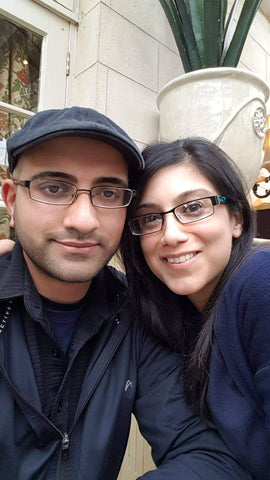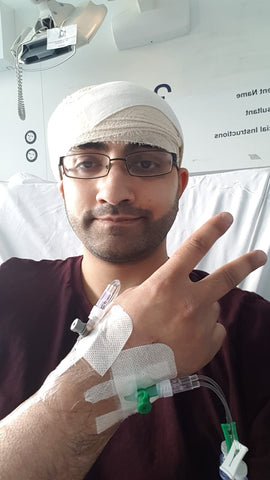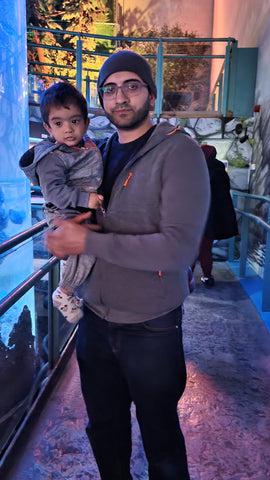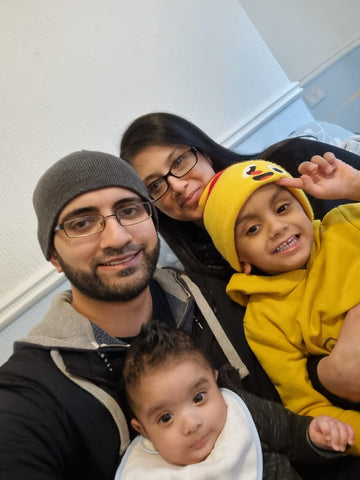Shaf from Birmingham was diagnosed with terminal brain cancer following health concerns surrounding the COVID jab in April 2021. The father-of two suffered episodes of pins and needles, focal seizures, and speech loss before he was diagnosed with a grade 3 anaplastic astrocytoma. As Shaf approaches his 40th birthday he’s sharing his story to highlight the lack of funding into researching the disease and is seeking private treatment in Germany, in a bid to have more time with his young sons.

Shaf tells his story…
My diagnosis came amongst the time of health concerns surrounding the COVID jab in April 2021. The medical team seemed to have no desire to scan me until the consultant heard me mention I had the jab two weeks earlier, I was rushed for a CT scan.
When I look back, I wonder if there were warning signs before. The most obvious sign of a change in my health came one day in the car park at work, I was talking to my colleague and all of a sudden had an out-of-body experience. My balance went, I had pins and needles in my right arm and hand and I lost the ability to speak. It passed after a few minutes and by the time I got to my car I was completely fine. I put it down to lack of food and being a bit dehydrated.
Days later, the same thing happened but this time my arm seized up entirely. I felt it was a precursor to a stroke. I was clumsy and started dropping things on the floor and couldn’t understand or recognise where my body parts were.

The same morning I was changing my son’s nappy, my hand shut down, I couldn’t move my fingers from a clenched position. I called to my wife Mim, to help, who at the time was upstairs. She was three months pregnant with our second child, throwing up from hyperemesis gravidarum (severe sickness).
We contacted 111. Mim gave them a rundown of my symptoms and they asked to speak to me. When I held the phone, after a minute I lost the ability to speak. As much as a I tried, I was unable to make a single sound.
They referred my case to a paramedic team who came to the house. They did all the checks and by this point everything had passed, my speech returned and they thought I could have some kind of shoulder impingement. However, Mim wanted a second opinion and insisted I go to hospital. I didn’t want to cause her any distress during what had already been a challenging pregnancy.
Tests at the hospital all came back clear, my vital signs were presenting what they expected in a healthy person.
“They didn’t know what was wrong and seemed extremely reluctant to give me a scan despite my episodes of speech loss and a numb arm, which I later found out were focal seizures.”
Weeks earlier I had a COVID jab which at the time carried a health warning of a potential embolism. As I was speaking to the nurse, a consultant was walking past my bed and our conversation piqued their interest and I was sent for an emergency CT scan.
The scan showed a dark wedge shape which they attributed to a lack of oxygen to my brain and they concluded I had suffered a stroke. My case was referred to the Queen Elizabeth (QE) in Birmingham where I would be treated with the expectation of Mim coming to collect me within a few days.
I was given an MRI scan to shed more light on what was happening in my body. I was met with a doctor and their entourage who said to me: “sorry, you’re not going home; you have a brain tumour”.
It felt like a real sucker punch to which I asked what the tumour type was and if it was cancer. Hesitant and almost nervous to respond the consultant asked if I was sure that I wanted more information on their findings. I’m a pragmatic person, of course I wanted to know. When I was told they suspected the tumour was a glioma, I had a shock from the online search results and life expectancy which can vary depending on its grade.
I phoned Mim who was already in the car with her mum on their way to collect me. I told her to park the car and not worry about coming to pick me up due to doctors finding a brain tumour. Knowing that I can sometimes be a bit playful and a bit of a joker, she thought I was having a laugh but when it sunk in it hit her like a ton of bricks.
Two months later in June, I had a six-and-a-half hour awake craniotomy. Around an hour into the procedure I was woken up to the sight of ten healthcare professionals, each there to play a role in checking my reactions, speech and cognition as the neurosurgeon removed parts of the tumour.

They continued to test areas where the mass was attached to my brain, I felt a tugging and when my right-side dropped and my speech stopped, that signalled the surgeon to back off and was the end of surgery, leaving a small part of the growth behind.
The operation was deemed a success and an almost near total resection which left me learning how to speak again. I communicated by pointing at letters and numbers on a board and with speech and language therapy until I found my voice again. Mim was at home due to COVID restrictions and we would communicate with charades.
A histology report confirmed my tumour was a grade 3 anaplastic astrocytoma and the average survival time is three to five years. As a healthy thirty-something I was told that I could get to the top end of this statistic.
I received the NHS standard of care for cancer patients; six weeks of radiotherapy followed by a year of chemotherapy, during which time our son, Zidan was born in September 2021 which was a moment I didn’t think I’d get to see.

Chemo finished in August 2022, during which time it came with no end of alternating side effects. Every month it was something different; I had tinnitus, became sensitive to light and sound, suffered with a variety of headaches, chronic fatigue and experienced extreme changes in my bowel movement.
A year later after a routine scan, I was told that the tumour had recurred. This time its growth deemed the cancer inoperable. Further surgery would risk my quality of life and pose serious effects to motor functions, and could cause sightlessness, speech loss and impair my cognition. In October 2023 I started chemotherapy again to stabilise the cancer, and I’ll be on this treatment for as long as it’s effective.

Where do you go for help, beyond what’s available to you in hospitals? It feels as though my life has already been forfeited by the medical teams who are bound by the existing and limited research into brain tumours. Where is the investment into a disease that one in three people knows someone is affected by?
I’ve asked about clinical trials all over the world but I don’t meet the very specific criteria. Speaking to members of the brain tumour community has led us to set up a gofundme page for private treatment in Germany. It costs £100k for a series of personalised vaccines that could add an unknown amount of time to my life.
I am so blessed having Mim and my two boys as a reminder to keep fighting every single day. I’m grateful for the life I have led so far and I hope that I can help raise awareness and be part of the change for future patients and families living with the disease.
Shaf Ahmed
December 2023
Brain tumours are indiscriminate; they can affect anyone at any age. What’s more, they kill more children and adults under the age of 40 than any other cancer... yet just 1% of the national spend on cancer research has been allocated to this devastating disease since records began in 2002.
Brain Tumour Research is determined to change this.
If you have been inspired by Shaf’s story, you may like to make a donation via www.braintumourresearch.org/donate or leave a gift in your will via www.braintumourresearch.org/legacy
Together we will find a cure

